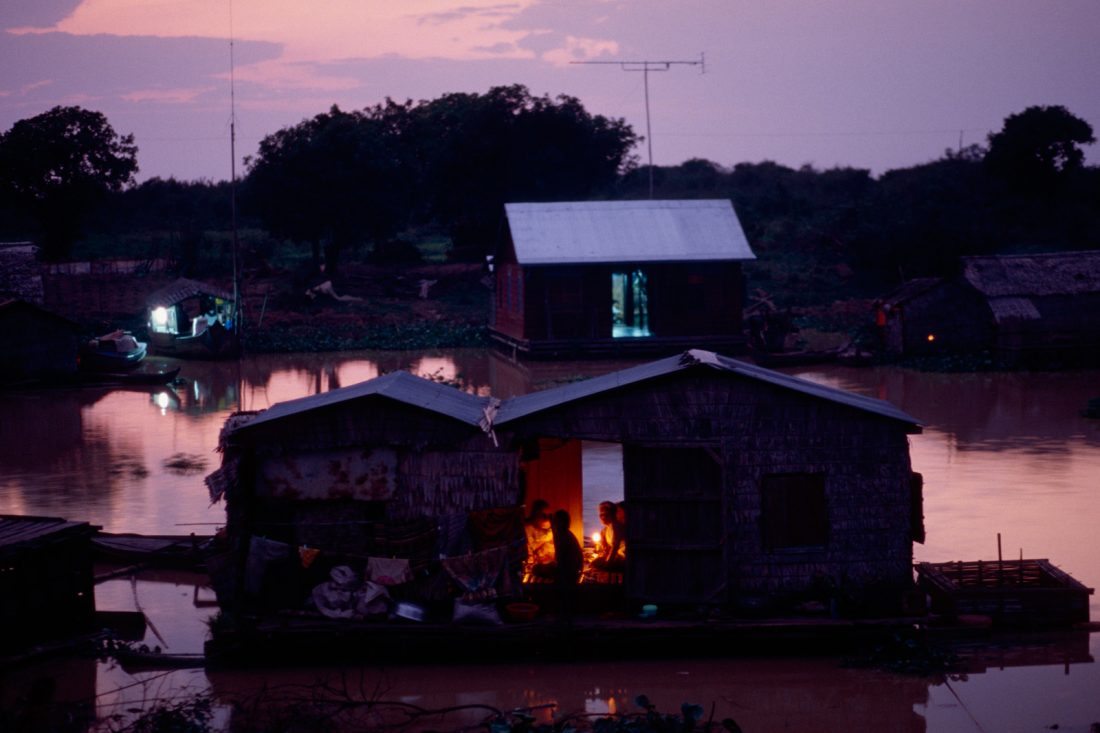Cambodia
Translated from the Spanish by Andrew Hurley
The waters of the Tonle Sap River look still, almost motionless. The river is in no hurry. This is the city of Phnom Penh, flowing alongside the river. Fishermen drift by with their precious cargo; barges incessantly crisscross the chocolate-colored waters; canoes carry tourists to the islands and the villages along the river with their Muslim and Vietnamese minorities. People gather all along the wall beside the river, on this avenue built on a large dike that in the rainy season barely holds back the river. During the rainy season, the river swells up like a hungry jungle animal.
As night falls, families enjoy a picnic beside the river. Stalls and stands sell smoked fish, grilled fish with peanut sauce, strips of meat cooked on charcoal braziers, white rice mixed with a slightly fermented fish paste, and khao phoune, rice-noodle soup with coconut milk, mint, lemon, and ginger, but without the spice they use in Thailand. Beside the pagoda are the lotus and incense vendors — offerings to the smiling Buddha — a shirtless men selling fragile brown birds that the faithful set free, to cleanse their karma. Fortune-tellers try to trap shifty fate under their wan oil lamps; fifteen-year-old monks, heads shaved, dressed in long orange robes, listen open-mouthed to the latest rock singer; and couples embrace surreptitiously among the crowd gathered around the snake-charmer.
Cambodia has unquestionably suffered as much as any country on earth. Indochina has been in conflict for centuries, with only brief parentheses of peace. But the years following 1970 — first when it become involved in the Vietnam War and then with the genocidal Khmer Rouge regime, which murdered a third of the population — have left an especially profound mark on the country. It is common to see people who are mutilated. The psychological damage is harder to see, but you discover it if you scratch the surface.
I remember one afternoon with a charming old gentleman, Sen Phon, in the village of Jummik. I talked to him a long time about the Pol Pot regime. The most idealistic of the Cambodians, those who wanted to build a just, egalitarian society, turned into monsters when they came to power. Sen Phon told me this: “What the Khmer Rouge did was give power to the marginalized, the resentful, the most ignorant; many of them were driven by revenge. A rich man, a person who came from the city, was the enemy. A doctor, a professor, an artist was the enemy. Any person who had the slightest reservation about Marxism was the enemy. Any person who did not eat his soup with rice enthusiastically enough — two pounds for forty people — and give thanks for it was the enemy. Any person who did not work until he dropped was the enemy. Any person who fell asleep during the Communist indoctrination classes was the enemy. Only the mute, the ignorant, the obedient blind had the right to live.”
I asked Sen Phon who the murderers were, and he answered, “Normal people, like you and I. They thought that if they didn’t kill first, someone would kill them. But basically they were perfectly normal people. The one thing that characterized the most fanatical soldiers may be that they were all so young, some even just children — and children are the most cruel of all because they cannot put themselves in the other person’s place, cannot think of the other person’s suffering. They think that all abuse is justified because at last, a just society is going to be built.”
Sen Phon, with his tousled white hair, squatting, looked at me and laughed out loud. “It’s that after spending a whole day with you, I’ve realized that although I don’t understand a thing you say, and you don’t understand a thing I say,” my friend Peter translated, “we laugh in the same language.” Another delicious burst of laughter. “You see how well I laugh in Spanish?!”
I laugh with blessed abandon! “And you see how well I laugh in Khmer?” I say to him gratefully — for I am profoundly grateful.
What horrors have been committed in the name of justice, religion, peace! The road is as important as the destination. How much we need to laugh, talk, share. The road to peace is built by tiny concrete acts of good will. How many little brown birds must we set free in order to recover goodness?














